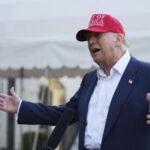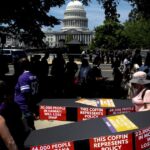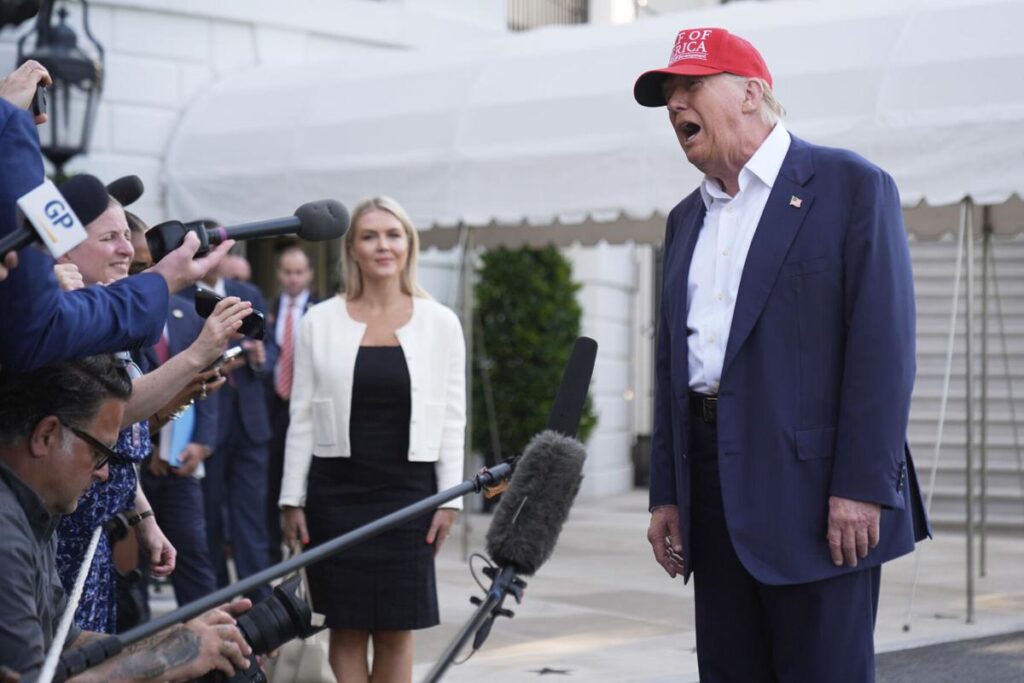The escalating war of words between billionaire Elon Musk and former President Donald Trump has reached new heights, centered around a contentious tax bill that proposes significant tax breaks and spending cuts. Musk has hinted at forming a new political party in response, while Trump has criticized the Tesla CEO over electric vehicle subsidies.
The debate intensified when Musk took to social media to voice his concerns about the bill, which he claims could stifle job growth and hinder emerging industries. Just three days ago, Musk described the legislation, which Republican senators are eager to pass, as “political suicide for the Republican Party.”
Amidst a tense overnight session in the Senate that extended into Tuesday, Musk suggested he would actively campaign against members of Congress who support the bill. He stated on X, formerly known as Twitter, “Every member of Congress who campaigned on reducing government spending and then immediately voted for the biggest debt increase in history should hang their head in shame. And they will lose their primary next year if it is the last thing I do on this Earth.”
The Political Stakes
Musk’s posts have garnered significant attention, with one viewed 26 million times. He further escalated the situation by proposing the creation of a new political entity, the “America Party,” should the bill pass. “If this insane spending bill passes, the America Party will be formed the next day,” Musk declared. “Our country needs an alternative to the Democrat-Republican uniparty so that the people actually have a VOICE.”
His post about the America Party attracted 32 million views, indicating widespread public interest in his political ambitions.
Trump’s Counterattack
Meanwhile, Trump has not remained silent. On Truth Social, he criticized Musk for his reliance on electric vehicle mandates and subsidies, suggesting that without them, Musk might have to “close up shop and head back home to South Africa.” Trump further claimed, “Elon may get more subsidy than any human being in history, by far.”
Trump also hinted at potential national savings if Musk’s ventures were curtailed. “No more Rocket launches, Satellites, or Electric Car Production, and our Country would save a FORTUNE,” he posted. He humorously suggested that the Department of Government Efficiency, or DOGE, should evaluate the situation, adding, “BIG MONEY TO BE SAVED!!!”
Historical and Economic Context
This clash highlights a broader debate over government intervention in the economy and the role of subsidies in supporting innovation. Historically, the U.S. government has used subsidies to promote industries deemed vital for national interests, from agriculture to aerospace.
Experts argue that while subsidies can accelerate technological advancements, they also risk creating dependency. Dr. Lisa Thompson, an economist at the University of California, notes, “Subsidies are a double-edged sword. They can drive innovation but also lead to market distortions if not carefully managed.”
The current bill, which aims to address fiscal imbalances, has reignited discussions on the sustainability of such financial support, particularly for industries like electric vehicles and space exploration, where Musk is a key player.
Implications and Future Prospects
The implications of this high-profile disagreement extend beyond personal animosities. Should Musk proceed with forming a new political party, it could disrupt the traditional two-party system, potentially attracting voters disillusioned with existing political structures.
However, the feasibility of such a party succeeding remains uncertain. Political analyst Mark Reynolds suggests, “Third parties historically face significant challenges in the U.S., from ballot access to fundraising. Musk’s influence and resources might give him an edge, but it won’t be easy.”
As the Senate continues to deliberate the bill, the outcome could shape the political landscape and economic policy for years to come. Both Musk and Trump remain influential figures, and their actions will likely continue to capture public and media attention.
The unfolding saga between Musk and Trump underscores the complexities of balancing economic policy with political strategy, a challenge that will persist as the nation navigates its fiscal future.
About The Author
 Israeli Hostage Tortured to Death by Hamas Over Tattoo Misunderstanding
Israeli Hostage Tortured to Death by Hamas Over Tattoo Misunderstanding Tragic End for Backpacker Juliana Marins: A Journey of Courage and Heartbreak
Tragic End for Backpacker Juliana Marins: A Journey of Courage and Heartbreak Senate Poised to Pass Trump’s Major Tax and Spending Bill
Senate Poised to Pass Trump’s Major Tax and Spending Bill Senate Republicans Pass Trump’s Tax and Spending Bill Amidst Tense Overnight Session
Senate Republicans Pass Trump’s Tax and Spending Bill Amidst Tense Overnight Session “The Bear” and “28 Years Later” Dominate Streaming Spotlight
“The Bear” and “28 Years Later” Dominate Streaming Spotlight